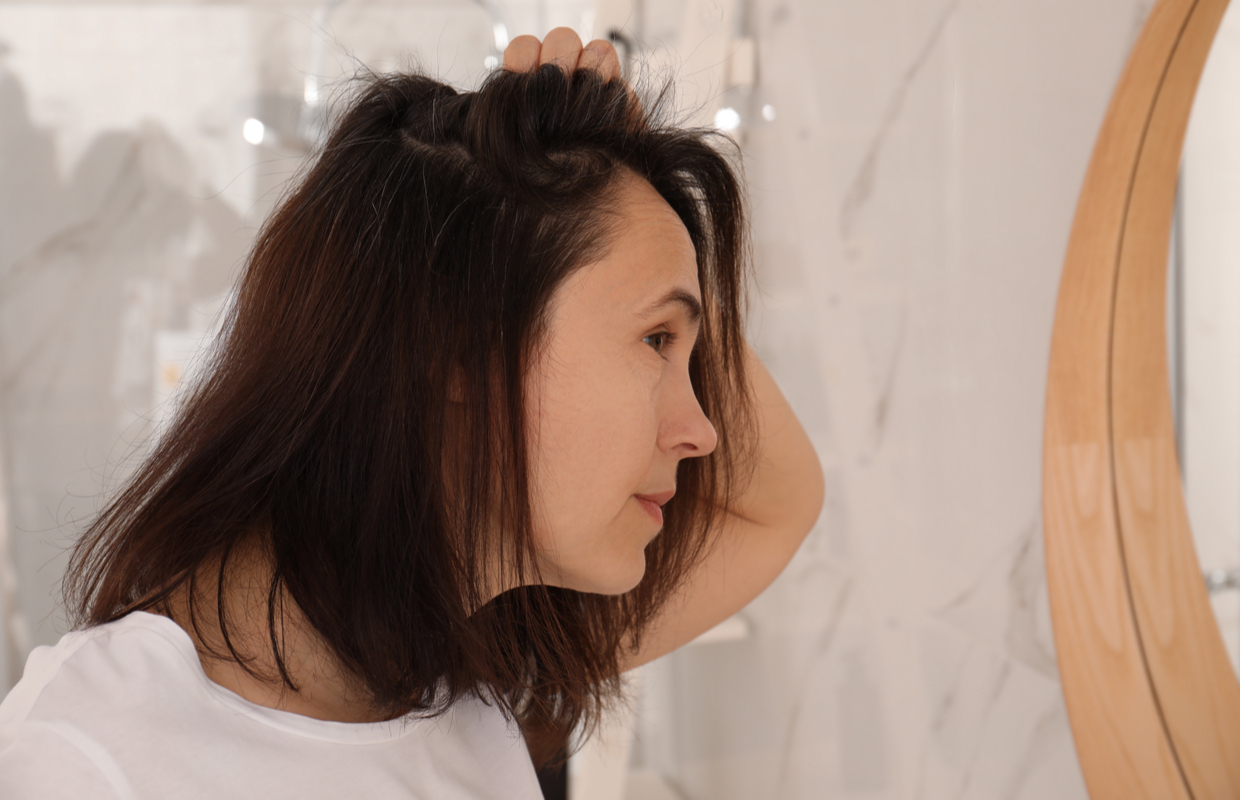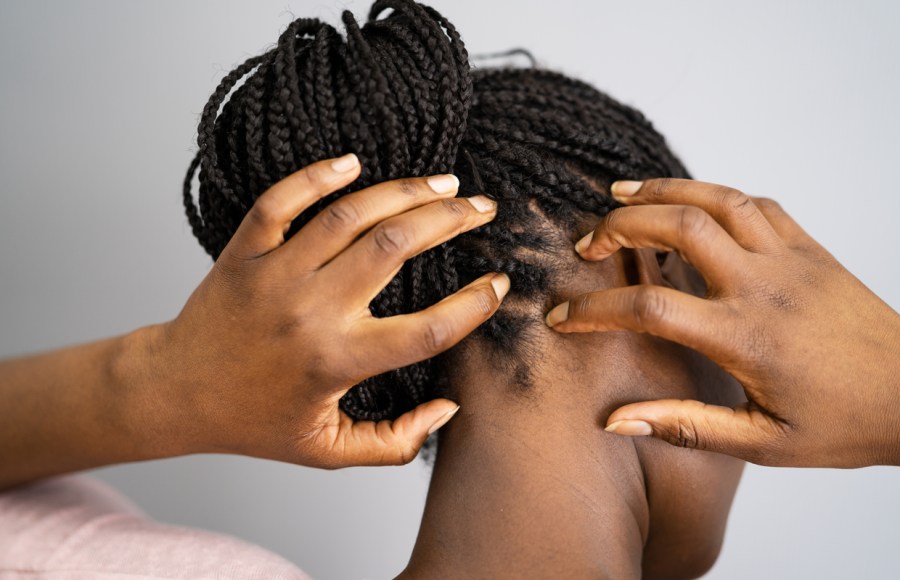Healthy hair starts at the roots – but how does menopause affect your scalp? Learn how to improve your scalp health and treat a flaky scalp before, during and after the menopause with these top tips and DIY remedies…
A good hair day not only lifts your look but also your mood, so it’s no wonder we relish time in a salon chair, like to try the latest hair products, and put lots of effort into our ‘do’. However, no matter how on trend your cut is, or how much you spend on potions, the secret to swishy strands actually lies in your roots, or more specifically your scalp. Let’s face it, scalp health isn’t the sexiest of topics, but the truth is that giving it some attention can pay serious dividends – especially as your age. But, how exactly does menopause affect your scalp?
What causes a flaky scalp?
The first thing to remember about scalp health is that is affects us all – last year Google reported a surge in searches for dry scalps – and it isn’t necessarily our fault. Dryness, flaking and irritation will come to everyone at some stage and it can take a while to notice there is something going on up top. At first you may notice your hair around your scalp feels drier, or a few flecks on the shoulders of darker outfits. But scalp issues can develop to full-on flaking, red irritation and side effects such as stunted hair growth or even hair loss.
Scalp issues can be down to diet, outside stressors such as pollution and even styling products, which can build up if not washed out properly and then go on to annoy the sensitive scalp skin. However, the biggest scalp changes occur just before, during and after the menopause, with hormones playing an important role. Let’s take a closer look at how menopause affects your scalp health…

How does menopause affect your scalp?
As you approach the menopause, your level of oestrogen starts to decline, which does have an affect on your scalp. ‘Oestrogen affects the life cycle of hair and therefore scalp health,’ explains Natalie Carr, trichologist at Philip Kingsley. ‘As the secretion of oestrogen declines, so does the length to which the hair will grow.’
On top of this, hairs that are coming through are weaker, struggling to poke through the follicles, leading to clogging around the scalp and irritation. ‘The hair also begins to appear a little drier,’ adds Natalie. ‘This is a very gradual process and one that can be helped by shampooing every one to two days. Just like skin, your scalp can become very sensitive as the menopause begins, so it’s important you choose a shampoo that cleanses without causing any irritation or dryness.’
During menopause, your scalp is also affected by slightly raised levels of androgens within your body. ‘Androgens can cause extra facial hair and body hair but lessen scalp hair, not necessarily in numbers, but in diameter and length, resulting in loss of volume,’ says Natalie. This explains why some women report hair thinning during the menopause.
Stress and scalp health
Menopause is also a time when periods of stress can be a problem, leading to fluctuating cortisol levels. And a surge of cortisol can in turn lead to an increase in scalp sensitivity. In addition, the stress hormone can also affect the natural 28-day cycle of shedding and renewal of scalp skin cells, slowing it down so you get more build-up and irritation on the scalp.
Another menopause side effect, which follows these initial hormone changes, relates to how much sebum – scalp oil – we are able to produce. ‘Sebaceous secretion decreases gradually after menopause,’ reveals trichologist Lisa Caddy. ‘This can lead to the feeling that hair is becoming wiry or coarse when in fact it may just be less lubricated as a result of lowered sebum production.’
And this leads to changes in pH balance. ‘As sebum is acidic, the scalp may become less acidic in later life, however, this won’t affect the overall condition of the hair, it just may need a boost from shine sprays or scalp specific conditioners.’
How does nutrition affect scalp health?
Nutrition can play a key role in scalp health. ‘Hair is a dispensable tissue –psychologically it is hugely important, but physiologically we could easily survive without it,’ says trichologist Anabel Kingsley.‘ In terms of diet this means that our hair is never given priority – it’s the last to receive any nutrients we take in and is the first part of us that gets these withheld.
If you are deficient in any vitamin or mineral your hair will usually be the first thing your body neglects. While a balanced diet containing all food groups is key, hair is made of protein, making adequate daily consumption of protein highly important. Aim for a 120g portion of a “complete protein” with breakfast and lunch, when nutrient requirements are greatest. Good examples are eggs, fish, lean meat, tofu, lentils, poultry and low-fat cottage cheese.
5 DIY natural remedies for a dry or irritated scalp
Ward off a flaky scalp with these simple and affordable DIY scalp treatments…
Aloe Vera:
Simply add a few drops of extract to your shampoo.
Apple cider vinegar:
Makes a fab rinse for your hair after conditioning.
Coconut oil:
Smooth on a couple of teaspoons and leave for 10 minutes.
Baking powder:
Mix to a paste with olive oil then massage into your scalp.
Bananas:
Mash up and leave on your scalp while you’re in the bath.
Words: Carly Hobbs | Photos: Shutterstock








